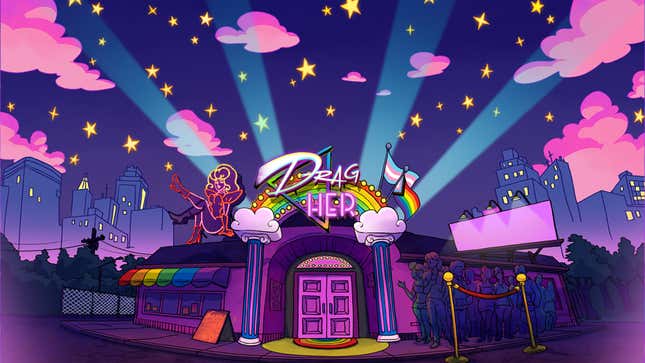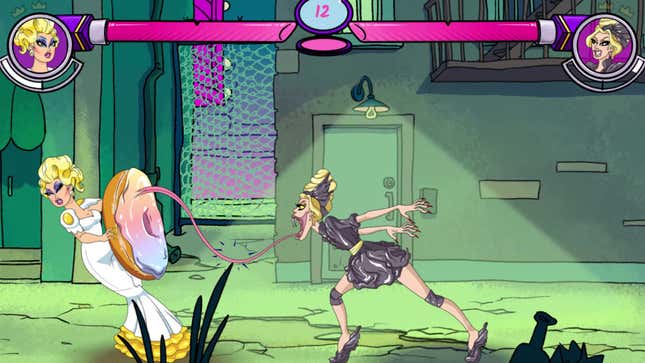On May 15, the official X (formerly Twitter) account for Drag Her!, an indie fighting game set to feature famous drag performers, shared a sad update: After three years of development, and around $75,000 in funding via Kickstarter, the game was shutting down and the dev team was disbanding. The reason? “A simple lack of funding.”
An unfinished version of the game, called Drag Her! Failure to Launch Edition, launched for free on Steam the next day.
“We took a huge creative risk in a system stacked against our success,” the announcement read. “Still, we labored in isolation, harnessing the talent of a small group of deeply creative and passionate people to create what is a fundamentally fun fucking game.” The statement was emblazoned over an image any Ru Paul’s Drag Race fan could immediately identify: drag queen BenDeLaCreme’s shock self-elimination from All Stars season 3. It was biting, bittersweet, and bitchily hilarious.
Kotaku reached out to the team behind Drag Her! to learn more about what they wanted the game to be, what they learned about developing a game in a still mostly homogenous industry that’s hemorrhaging talent, and their gratitude for their community.

A “less-gay Mortal Kombat”
Drag Her!’s concept was simple enough: a “fast, frenetic, and fabulous 2D fighting game featuring a cast of famous drag stars,” developer Ian Ramsay told Kotaku via email. “Or at least it was before we got Thanos-snapped.” It was pitched as “less-gay Mortal Kombat” and a small team started working on it with money Ramsay had earned selling fabric during covid.
On paper, drag performers and fighting games are an almost unnervingly perfect fit. Drag queens are visually iconic—they often have their own unique ways of “painting” (doing their makeup) or “padding” (creating a feminine figure), and are always dressed to impress in bold colors, sequins, and mile-high wigs. They already look like video game characters, and they’d be instantaneously recognizable in a fighting game lineup. Plus they are notoriously catty, frequently “reading” (dissing) each other and throwing barbs about each other’s style, personality, or “mugs” (faces). That their reading sessions could eventually devolve into a slap fest isn’t just believable, it’s surprising it hasn’t happened on TV yet.
Drag Her!’s small dev team put together a demo, which got them a grant from the International Game Developers Association, and then they launched a Kickstarter. They had signed several iconic drag performers, including Alaska 5000, Kim Chi, Laganja Estranja, and drag king Landon Cider to be a part of the game’s roster. “So many of them were gamers and eager to see this brought to life,” Ramsay said. “When we set out to make this, we wanted to ensure the queens & kings came as equal partners in the project. They were paid for their voice and likeness, as well as providing feedback and having final say on their character’s design. We were fans first, and ultimately wanted them to feel happy with their project. Fun fact: every drag star wants to be taller than one other!”
And though the team’s Kickstarter and its nearly 1,000 backers helped “moved the needle significantly,” they ran into serious problems when it came time to find a publisher.

Too gay to function
In an industry still plagued by the vestiges of racism, sexism, homophobia and all the other tenets of a small group of loud assholes determined to maintain the status quo, publishing Drag Her! was an uphill battle. In their quest to find a company willing to shell out cash to help scale up production and eventually get the game on storefronts, Ramsay told Kotaku that they got some “wild and hilarious” feedback.
“We had a Polish publisher state that gay people don’t play games, and he knew that because he went to a gay bar in Krakow once,” Ramsay said. “But the only real consistent and poignant feedback was a wariness of the fighting game genre; one which is dominated by a few big players with few indie successes to point to…I’d be remiss if I didn’t think the femme-forward cast and overt LGBT+ themes didn’t invite further scrutiny.”
Ramsay continued:
We were at an unfortunate nexus of market pressure and need to drive shareholder val—lol no, really we were just too gay. It’s well-known where the most capital is concentrated, and we were a developer and audience demographic that existed well outside of the norm.
Despite signing deals with Sony and Xbox, sweeping first place at awards shows like AT&T Unlocked, despite curating a killer audience, and earning darling indie status at game festivals, no amount of legitimacy would ever broach the divide between us and the people who hold the pursestrings.
We spent many years educating very boring men on the commercial and cultural impact of drag, but very often we were just stared at as if we grew a third head. While people in power were rooting for us, they weren’t supporting us materially, and so eventually, we fell.
The team’s announcement of the game’s “failure to launch” spoke of their plans to “showcase the sheer joy of queer culture,” something that is far too often either obfuscated or forced to the margins in this industry. Queer characters in games like Apex Legends or Overwatch aren’t all that noticeably queer when you play them, you’d only know they were if you were into the lore that exists outside of matchmaking. Drag Her! was a bold attempt to take a very masculine space—fighting games—and unabashedly queer it. It’s a shame that we didn’t get a chance to see it in its most gagworthy, divalicious form, but Ramsay and the team are “grateful for the outpouring of love and support.”
Diva down, but not for long.
“While the industry is experiencing some of its most painful attrition in years, indies are still out there releasing some of the most well-received games on Steam. Gamers are out there, putting down their dollars to support wild concepts, previously dead genres, and anything with unique gameplay,” Ramsay said when I asked if he was hopeful for the scene’s future. “I have fielded many calls from other queer devs, and I impress upon them that our story isn’t theirs. I have hope that there continues to be a nascent market for queer indie titles, and I need other LGBT+ folk to continue to thrive, survive, and flourish.”
Credit : Source Post

